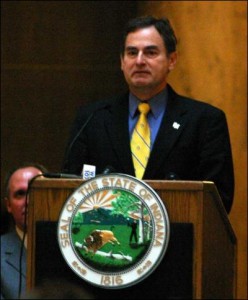
Is Mourdock running for re-election on the tails of an industrial tragedy?
At the same time Chrysler LLC was supposed to be proceeding with its sale to Fiat SpA on June 5th as approved by the U.S. Bankruptcy Court in New York, objecting creditors will be arguing their case yet again in the U.S. Court of Appeals for the Second Circuit in New York City.
The appeal was expected from the State of Indiana, which holds a miniscule portion of Chrysler debt, less than 1%, in retirement funds, and the outcome will likely be the same — the Chrysler sale will proceed some time next week.
“We are pleased the Court of Appeals has agreed to hear our arguments,” explained State Treasurer Richard Mourdock. “As we have stated from the beginning, Indiana retirees and Indiana taxpayers have suffered losses because of unprecedented and illegal acts of the federal government.”
In the Bankruptcy Court decision of Judge Gonzales, he cited Congressional laws going back to the 19th century and their subsequent revisions, to dismiss dissident bondholders’ claims. Simply put, the Chrysler sale decision revolves around basic and well-known fundamental principles of bankruptcy law.
Under the decision, Fiat will get the assets related to the research, design, manufacturing, production, assembly and distribution of passenger cars, trucks and other vehicles, including prototypes, under brand names that include Chrysler, Jeep and Dodge.
The Chrysler case has moved exactly along the lines that members the U.S. Treasury’s Auto Task Force outlined in a background briefing to media on April 30th when President Obama made the restructuring announcement and Chrysler LLC filed for court protection. Pundits who said it couldn’t be done swiftly have been proven wrong thus far.
The decision is the triumph of common sense and law over narrow and unsound arguments by lawyers for the debtors. Simply put, the “quick rinse bankruptcy” backed by funding from U.S. taxpayers is the only way to give Chrysler and soon GM a chance – and it is just a chance – to survive. This “preserves the estate,” allowing the largest possible settlement.
In his 47-page decision Judge Gonzales wrote: ” On May 19, 2009, the Indiana State Teachers Retirement Fund, Indiana State Police Pension Trust, and Indiana Major Move Construction (the “Indiana Funds”), which oversee the investment of retirement assets for certain civil servants in the state of Indiana, filed an objection to the Sale Motion. The Indiana Funds hold approximately $42 million of the $6.9 billion in first priority secured claims, which represents less than 1% of the first-lien debt.
“In their objection, the Indiana Funds argue that pursuant to the Sale Motion, the First-Lien Lenders’ collateral would be stripped and, in return, those lenders would be paid 29 cents on the dollar. The collateral would then be transferred to New Chrysler, where, according to the Indiana Funds, it would be worth significantly more than the money paid to the First-Lien Lenders. The Indiana Funds further argue that unsecured deficiency claims would not be paid while unsecured trade debt would be paid in full.
“In addition, the Indiana Funds contend that their senior claims will be impaired while the Governmental Entities, as junior lien holders and VEBA and the UAW, as unsecured creditors, will receive value. The Indiana Funds also object to Fiat receiving a stake in New Chrysler for its grant of access to the “small car” technology without a cash contribution,” said Gonzales.
He then refuted each of these points in detail and said “the Court finds that all relevant standards have been established to grant the relief requested (the sale of Chrysler to Fiat).
“All objections, if any, to the Sale Motion or the relief requested therein that have not been withdrawn, waived, or settled as announced to the Court at the Sale Hearing or by stipulation filed with the Court, and all reservation of rights included therein, are hereby overruled,” Gonzales concluded.
Nonetheless, Indiana is claiming once again that the sale is illegal. In the unlikely event Indiana prevails Chrysler will be dissolved.
Some critics say that there is a political motivation behind Indiana’s ongoing attempt to destroy Chrysler. Mourdock is a Republican, who, like many in that party, will face a tough re-election campaign.
